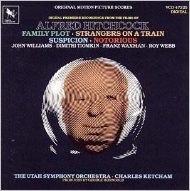 |
NotoriousRoy Webb |
|---|
 |
NotoriousRoy Webb |
|---|
|
Original music by Roy Webb John Williams, Dimitri Tiomkin Utah Symphony Orchestra - 1985 George Korngold - Producer 4 Tracks, Total Time 37:57 |
Contains a 5:46 minute suite from Hitchcock's Notorious, 1946. Disc also contains suites from Strangers on a Train, Suspicion, and end credits from Family Plot. |
|
By far the least well-known composer on this album is Roy Webb, who died in 1982 at the age of 94. He did two of Alfred Hitchcock's film--the comedy Mr. and Mrs. Smith (1941) and Notorious (1946). Webb spent most of his working life at RKO Radio Pictures, for whom he scored many distinguished films: among them The Last Days of Pompeii (1935), Welles' Journey into Fear (1942), Lewton's Cat People (1942), Murder, My Sweet (1944), The Spiral Staircase (1946), I Remember Mama (1948), Crossfire (1947), The Enchanted Cottage (1945), and many others.
In certain ways his technique was untypically (for Hollywood) sophisticated: he had a special feeling for atmospheric nuance and (as we can hear in Notorious) employed mutedly dissonant harmonic color and sparely evocative texture to great effect. The "Notorious Titles," however--and how splendidly attention-getting are those discordant trumpet alarms with which they open--also betray the hand of a fine Romantic melodist. The broad, spacious singing tune--a love-theme for American agent Devlin (Cary Grant) and his aide Alicia (Ingrid Bergman)--is put to good dramatic use in "Alicia Collapses," where, in tortured chromatic guise, it portrays the very-nearly successful attempt on the part of Sebastian (Claude Rains) and his mother to poison Alicia; what the music tells us, of course, is that in her extremity of sickness and confusion her mind is full of Devlin, from whom she is estranged.
Earlier there has come the most important musical sequence, the one which marks the film's turning point. Sebastian--key-link in a chain of uranium-smuggling Nazis in South America--goes downstairs and lets himself into his wine cellar. To begin with everything seems to be in order, but then he notices the stained floor, the stained sink, and finally the bottle Devlin has substituted for the one he had broken (which contained uranium) during his search. There is no dialogue; the drama must be enacted solely through Rains' facial expression, his actions and the music (here the trumpet alarms of the "Titles" return to chilling effect).
No less crucial is the music's contribution to the following sequence, "Troubled Mind." Rains walks slowly through the deserted house and up the staircase to his mother's room. Only the music tells us what must be passing through his mind--that he is ruined, that he has betrayed his mother, his country and himself and that he will pay with his life when his fellow Nazis-in-exile find him out. And in the film's last shots, when Sebastian mounts the steps of his house to meet his nemesis at the hands of his ruthless compatriots, the music swings eloquently to a close--like the huge front door--with an air of black and terrible finality.
--CHRISTOPHER PALMER, from the liner notes.
A selection of Notorious related music.
|
Find Notorious on eBay.com
A selection of Notorious in books.
|
|
home: The Film Noir 'net |
back to: NOIR MUSIC |
|
Any comments, additions or suggestions
should be addressed to: The Film Noir 'net / Eric B. Olsen / ericbolsen@juno.com |
Other Web Sites:
History of Horror Hard Bop Homepage The War Film Web Author Eric B. Olsen |